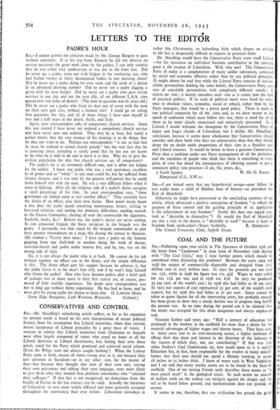PADRE'S HOUR
LETTERS TO THE EDITOR
cannot permit the criticism made by Mr. George Burgess to pass without comment. If in his trip from Alamein he did not observe on certain occasions the great work done by the padres, I can only surmise that he was either very unobservant or was not in the front line. Did be never see a padre, worn out with fatigue in the sweltering sun, who had buried twenty or thirty decomposed bodies in one morning alone? Did he never see a padre doing his own work and the work of a doctor in an advanced dressing station? Did he never see a padre digging a grave with his own hands? Did he never see a padre who gave eleven services in one day and ten the next day, all on different L.A.A. sites spread over too miles of desert? (The man in question was 61 years old.) Did he never see a padre who lived six days out of seven with the men on their own gun sites, without a batman also? I could- go on asking him questions like this, and all of them things I have seen myself in two and a half years in the desert, Sicily, and Italy.
Again, your correspondent talks of compulsory church services. Since this war started I have never yet ordered a compulsory church service., and have never seen one ordered. They may be at base, but surely a soldier knows that the very essence of his training is to do things that he does not want to do. Perhaps our correspondent " is not so bad that he must be ordered to attend church parade," but the very fact that he is grousing about attending is surely proof that he has not yet learnt to do what he is told to do and to leave it at that. Why try to give the civilian population the idea that church services are all compulsory?
The padre's lot is an extremely difficult one, and is often not helpea by the soldier. I knew one padre who was a real sportsman, excellent in all games and as " white " as any man could be, but he suffered from intense shyness, and it was only by the greatest will-power that he could make himself mix with the men. He was a very different fellow when it came to fighting. After all, the religious side of a padre's duties occupies a small percentage of his time. As your correspondent says, " these gentlemen are looked upon as just another officer." They certainly have the duties of an officer, plus their own duties. How many weary hours a day does the padre spend censoring monotonous letters, writing to bereaved relatives, and sorting out domestic difficulties, sending records to the Graves Committee, chasing all over the countryside for cigarettes, footballs, books, &c.? Believe me, the padre's duties are never ending. In one armoured brigade the finest navigator in the brigade was the padre. I personally saw him asked by the brigade commander to plot their present whereabouts on a map, this during the retreat to Alamein. (He stroked a 'Varsity boat once.) I have seen a padre on the Somme popping from one shell-hole to another doing the work of doctor, stretcher-bearer and padre under intense fire, and he, too, was on the wrong side of sixty.
No, it is not always the padre who is at fault. He cannot do his job without support, no officer can in the Army, and the simple difference is this. The Army officer gets his support because he enforces it, but the padre leaves it to the man's free will, and if he won't help himself why blame the padre? Men who have become padres after a brief spell of perhaps two or more years in their first curacy are, of course, pos- sessed of little worldly experience. No doubt your correspondent was not so long ago without Army experience. He has had to learn, and he must give his young padre his chance to learn also. G. LAWTON Moss.
Stone Edge Bungalow, Leek Wootton, Warwicks. (Colonel.)


























 Previous page
Previous page